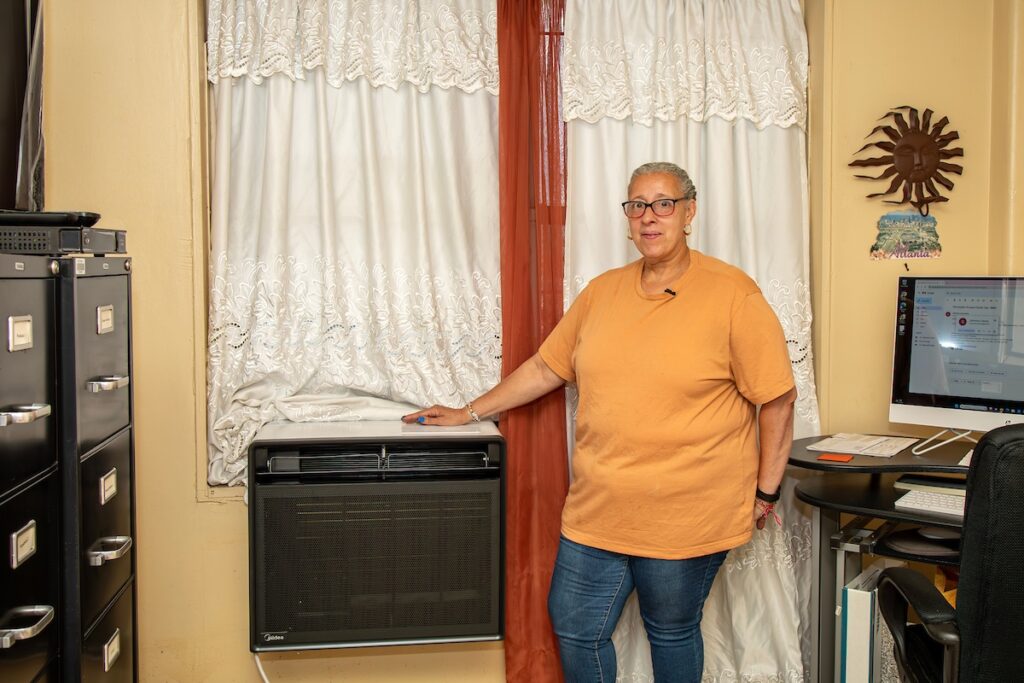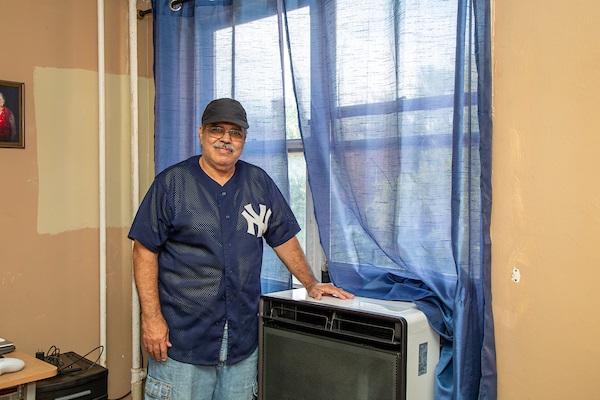Woodside Houses Residents Welcome Electric Heat Pumps
This winter, residents in two dozen apartments at Woodside Houses are getting their heating from electric-powered heat pumps for the first time.
No longer relying on apartment radiators, the residents have received complimentary heat pumps in their living room and bedroom windows, which provide both electrified heating and cooling services in support of the Authority’s efforts to decarbonize buildings. After an initial set of 36 heat-pump units were installed in 12 apartments at the Queens development to allow for cooling services this summer, a second set of 36 pumps were installed in another 12 apartments during the last week of November, just in time for winter.
The electric-powered devices, which move warm air between indoor and outdoor spaces depending on the season, are considered more energy efficient than traditional heating systems such as boilers, which burn fossil fuels to produce heat.
The heat pumps were installed as part of the first phase of a pilot program, as NYCHA seeks to expand the use of electric heating and cooling systems in buildings across the city to help reduce the Authority’s carbon emissions footprint. Along with the environmental benefits, the new pumps are welcomed for providing residents with a range of service improvements as they enter another heating season.
“They offer more consistent and reliable heat for residents, and they’re easier to maintain than our steam systems,” noted Jordan Bonomo, Senior Program Manager with NYCHA’s Asset and Capital Management Sustainability division. “It also gives more control to the residents so they can adjust the room temperature to meet their comfort needs.”
Residents working in the resident association office are among those who say they have noticed key upgrades from past heating and cooling services thanks to the electric pumps. In addition to praising the easy temperature control, Resident Association Treasurer Tammy Reyes said the units are very quiet and don’t block window views.
“When we put the heater on it’s so much better because you can adjust it to the way you like it,” said Ms. Reyes, who has lived at Woodside Houses for nearly 30 years. “The office is now very nice and warm and we don’t have to sit there with our jackets and sweaters on.”

Jose Soto is another longtime resident who began using the pumps for efficient cooling in the summer and has experienced a similar “night and day” difference in heating compared with the old radiator. He said the heat pump service has enabled an equally pleasant environment inside his apartment regardless of the outside temperature.
“I’m in love with it; it really works well,” said Mr. Soto, a Woodside Houses resident for more than 40 years. “When the temperature dropped under 40 it was really a pleasure to have.”
The installations at Woodside Houses were jumpstarted by an initial $70 million investment last year from NYCHA, the New York Power Authority, and the New York State Energy Research and Development Authority for the development and production of 30,000 heat pump units at public housing buildings. As part of the Clean Heat for All Challenge, Midea America Corp. and Gradient were selected for contracts to develop 20,000 and 10,000 window heat pump units, respectively, for use in NYCHA apartments in the coming years. The units are designed to feature minimal window obstruction and provide a more affordable option than other green technologies due to reduced installation costs.
During the pilot program and throughout the winter, NYCHA will monitor and assess the effectiveness of the first pump systems before moving forward with plans to install the electric units in the remainder of Woodside Houses apartments and at additional developments across the city.
Featured photo caption: Longtime Woodside Houses resident Jose Soto said the electric heat pumps have created a comfortable setting in his apartment regardless of the outside temperature.

